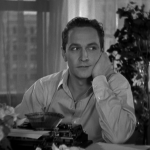 |
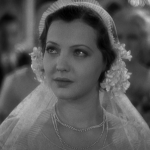 |
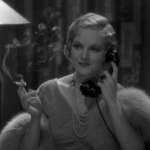 |
| Jerry Fredric March |
Joan Sylvia Sidney |
Claire Adrienne Allen |
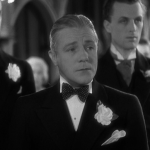 |
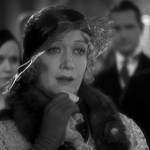 |
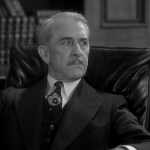 |
| Buck Skeets Gallagher |
Vi Esther Howard |
Mr. Prentice George Irving |
| Released by Paramount Pictures | Directed By Dorothy Arzner |
||
Proof That It’s Pre-Code
- The movie is based on a short story entitled, “I, Jerry, Take Thee, Joan.” This was changed to play up the salacious nature of the content. Like the movie or hate it, you have to admit that’s a pretty damn evocative title!
- Jerry’s pal and confidante Vi is the city editor on the newspaper he writes for. Yes, a woman editor, and there’s no fuss made about it at all.
- A turn in the film results in a married man cheating on his spouse. His wife forgives him, which he is grateful for, until she notes, “[I]f being a modern husband gives you privileges, then being a modern wife gives me privileges.” And she definitely grabs those privileges and runs with them.
- There’s some pretty sad stuff in the film’s final few minutes, but I’ll get to that in the spoilers.
Merrily We Go to Hell: A Spirited Drama
“Gentlemen, I give you the holy state of matrimony, modern style: single lives, twin beds and triple bromides in the morning.”
Booze. The tail end of Prohibition in the 1930s bought time for some self reflection on America’s part in regards to their weakness for the stuff. Some were ebullient, some sober. And for a number of people, Prohibition had merely been a road bump; the booze never stopped flowing, consequences be damned.
Merrily We Go to Hell is about one man’s struggle with the bottle and how it nearly destroys his life. It’s not quite alcoholism as we’ve been treated to in The Lost Weekend through Affliction. Rather than an addiction, it is a symptom. This isn’t the story of a good person waylaid by a tragic disease, but a rotten person who soaks in alcohol to make his pain go away.
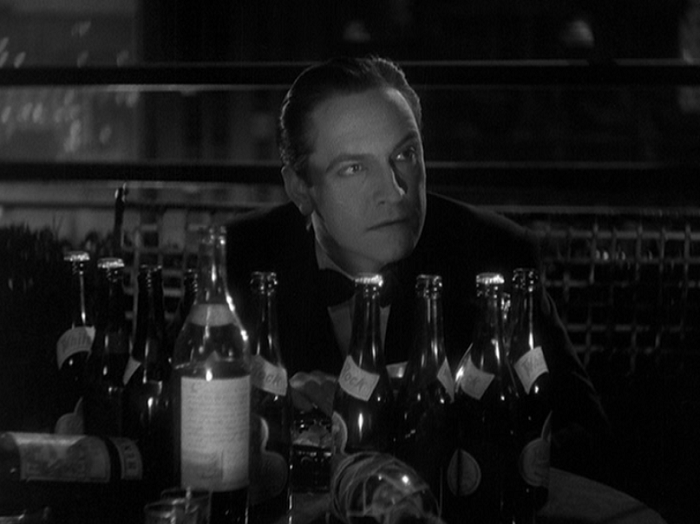
How can anyone be so rotten with this much brine?
That’s not to say that Jerry isn’t charming. Despite the fact he’s a newspaperman, he’s not your usual pre-Code smartass; he’s laid back and personable. Unlike Don Birnam, he’s not a pill when sober; quite the opposite in fact. He’s a nice guy most of the time, it’s just when he drinks its to mask his pain, and the deeper the well goes, the the more uninhibited he becomes. This may mean taking his drinking buddies across Chicago to find a good baritone, or it may mean yelling at a picture of the woman who broke his heart so many years ago.
That’s Claire. He keeps her picture above his desk, where he sees it every night. That’s not a good sign.
He meets Joan, a socialite and heiress to a meat packing fortune. She’s a sweet gal, but one who’s not much interested in the richer set. She meets Jerry at a party where he’s pretty soused, but his insistence that she’s “swell” wins her over. His talents (the only drunk newspaperman who’s been able to keep his job), ambition (he has the dream of being a playwright), and playful nature push her head over heels. Their first night alone in a car sees him accidentally leaning on the horn while they kiss– an unsubtle warning siren for the trouble ahead.
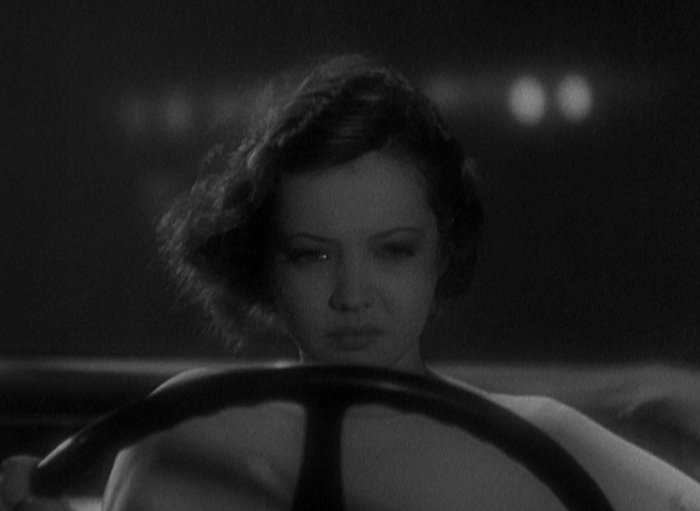
“*sniff* Owner of… a lonely heart… much better than an owner of a… uh… lonely heart.”
Jerry seems to be a bit taken as well, but there’s a definite reluctance. Because he’s a coward, though, Jerry doesn’t voice his issues but simply drinks until he passes out. That’s a hell of a way to practice avoidance, but Joan is so smitten that she pushes ahead with the wedding anyway, even after he’s carried out a bakers dozen of offenses that have upset her father and embarrassed her in front of friends. Her wedding ring is the end of a corkscrew.
Jerry sobers up for a few months and life is blissful. Tragedy strikes when Jerry’s play is picked up for production… but with old flame Claire in the lead role. She casually hands him a drink and he starts sipping.
Claire is a deeply fascinating character because so much of her story comes from Jerry’s reactions to her. His play, entitled “When Women Say ‘No'”, is hinted at being based on their romance, and ends with a big kiss and the curtain coming down. Jerry’s unresolved issues paint him as a romantic, someone deeply devoted to the idea of being in love with Claire even if he never sees anything in her besides her allure.
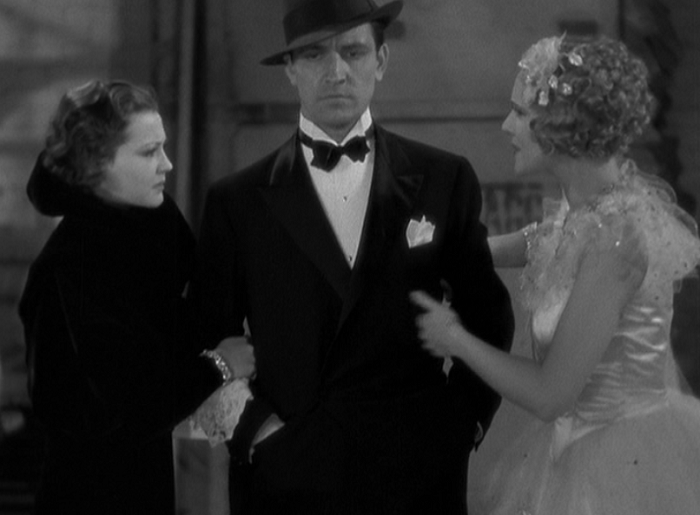
Not the remake of Design for Living we had requested.
The bad news is that now that Jerry is unavailable, Claire is interested. She calls him and curls her words around him, “If I said yes, I should mean no. And if I said no… I should mean yes. But my silence is true. And it’s all for you.” She’s very playful– she enjoys seeing Jerry squirm– but aloof. She’s a hedonist, though and through, and the movie doesn’t punish her for it one bit. She forces Jerry to make the moves, a boa in an evening dress.
And Joan is, understandably, devastated by all of this. Sylvia Sidney isn’t one of the better remembered actresses of the early 30s, but she handles Joan’s deterioration with poise and compassion. It’s a special kind of lovesickness she portrays, and her pain is palpable the whole way through.
She’s matched here by March, an actor of great shades of subtlety. His non-verbal ticks in this movie are brilliant, shifting from moments of sobriety and hope to unbalanced inebriation in a flash. Even though Jerry is thoroughly a shit head whose romantic devotion nearly destroys his health and his marriage, it’s hard not to feel for him– there’s an ounce of goodness in there, and it may take growing a spine for him to finally shake it out.
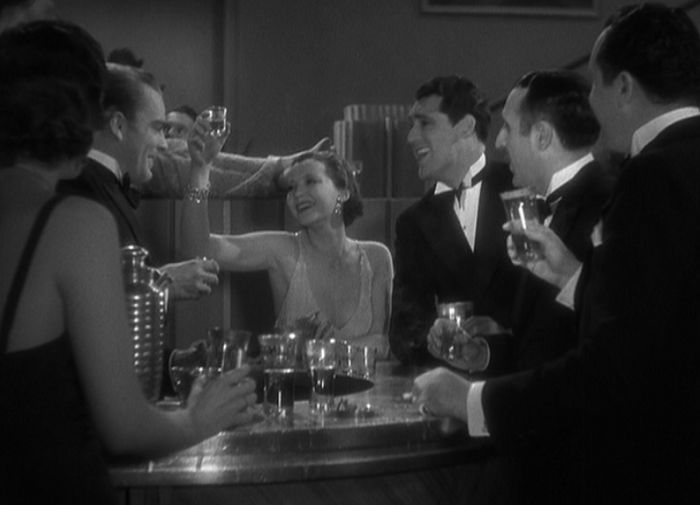
“I’ll drink to that!”
Spoilers.
Well, it actually takes more than that, naturally. After Jerry elects to make his affair with Claire quite public, Joan opts to be modern and make their marriage one in name only. This obviously pains both of them, but when Joan discovers she’s pregnant, Jerry finally sees for the first time that his love for Claire is only skin deep.
It’s a great scene where he finally tells off Claire, if only because she deeply, sincerely does not care at all. Jerry’s revelation is only a revelation to himself; what a putz.
He sobers up again, and rededicates himself to his job and his marriage, even if his wife refuses his letters, his flowers, and his pleas to see her. He learns that Joan is having the baby and rushes to the hospital only to find his frustrated father-in-law. The baby has died, and Joan isn’t doing too well herself.
But I can’t read the baby’s death as a punishment for Joan for her decision to sleep around and drink copiously, even if the cause and effect is there. But the real cause is Jerry’s weakness, his romanticism killed what should be the penultimate product of love. The film’s final moments, with Jerry briefly, finally standing up to Mr. Prentice by shoving him away and being at Joan’s side make him finally complete.
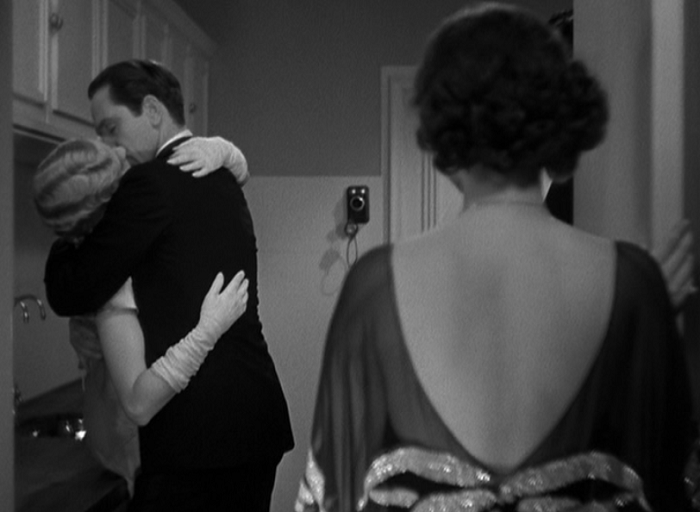
Crystallized awkward.
He has paid for his weakness, and now it is time to work towards a new life with Joan; one of work and pain and probably a fair share of resentment, but a future of real love.
End spoilers.
The film’s best scene is the play’s opening night. Jerry comes home trashed, only able to mutter Claire’s name, and Joan is heartbroken. She tries to drink herself into a tizzy so that she can understand what Jerry gets out of his habit. Instead, she catches him trying to sneak out and return to Claire. He demands she close the door to prevent him from going, but instead she throws him out. His devotion to the ideal of romantic value make him yearn to be controlled and pushed around; he has no faith in himself at all. This is Joan’s strongest scene in the movie as she is finally fed up with his habit and forces him to be culpable for his own actions. After he leaves, she totters back to the kitchen for another drink, sobbing and giggling, barely holding on.
Director Dorothy Arzner handles the film with remarkable grace, using March and Sidney’s talents to pull the story into dark and rarely tread places. Like Christopher Strong, Arzner knows to properly modulate the characters so we see everything from both sides of the picture. Even if Jerry’s a complete bastard, he’s Joan ‘s bastard.
Merrily We Go to Hell is less about alcoholism than the dangers of obsession, and the many ways that can undermine a man and hurt those he loves. Thanks to some great performances and a timely premise, it’s a shining gem of a drama that still reverberates all these years later.
Gallery
Hover over for controls.
Trivia & Links
- The Sheila Variations muses on the acting between the two leads, and admits to being fascinated with one particular line reading of March’s:
Fredric March, as he was memorizing his lines, or reading the script, knew that he had to say “You’re lying” twice. I don’t know his work process or how he worked, but whatever mysterious thing he did to prepare himself for that scene – led him to let it all go, not be technical, not over-think it … and not to “play” it at all. He is IN the moment. And THAT is a “choice”, and again: picture another actor who might have realized “Hm. This is my big moment in the film. Let me plan out how I will say it so that everyone will see that this is my big moment.” So the talent IS in the choice. Fredric March’s “choice” (conscious or no) led him to say those lines the way he did, and words cannot express how wonderful and how awesome he is. I am writing a lot about his acting right now, in a very technical way, but my experience of watching that scene had nothing to do with how awesome Fredric March is an actor. In the moment of watching that scene, all I thought was, “Oh my God. Jerry. I am so so sorry. I am so so sorry for what has just happened to you”
That is entirely due to how Fredric March played those two lines of “You’re lying.”
- There’s a scene early in the film where Jerry, upon arriving at Joan’s father’s mansion, finds the floors slippery and must leap between the carpets. It’s a cute little moment, but it reminded me of the scene where he begins to measure out the room in a mansion in All of Me. A pressing question: did Frederic March have it in his contract that he got to insert scenes of him wandering around a mansion humorously?
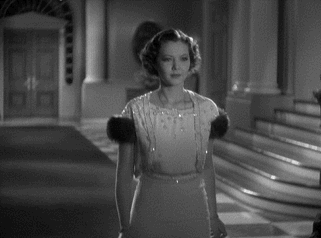
There’s some good ol’ fashioned March hinder for the ladies.
- The film contains multiple uses of the phrase ‘falling off the wagon’, a phrase which originated in the early 20th century. When there were copious dirt roads about, water wagons used to wet them to keep dust from being kicked up. Being on the wagon meant you were no longer being ‘wetted’. You can read more about the origins of the phrase here.
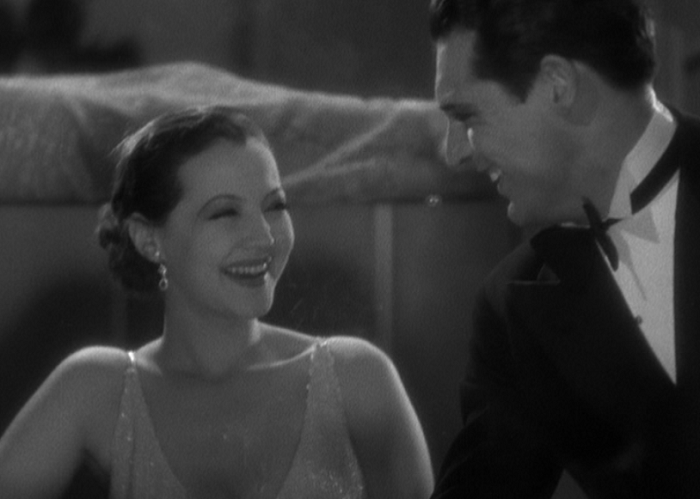
Bit part alert: Cary Grant arrives for a few minutes as one of the newly liberated Joan’s beaus.
- Mordaunt Hall in the New York Times didn’t understand the themes of the film.
- Cliff at Immortal Ephemera found the film pretty dull for the first hour, but admits that the last chunk picks up quite a bit. He also has a couple of images of collectables in the post. The March card is nice, but I’m not sure that Sydney card is very flattering.
- Noir and Chick Flicks has a detailed biography of Sidney attached to the end of their review.
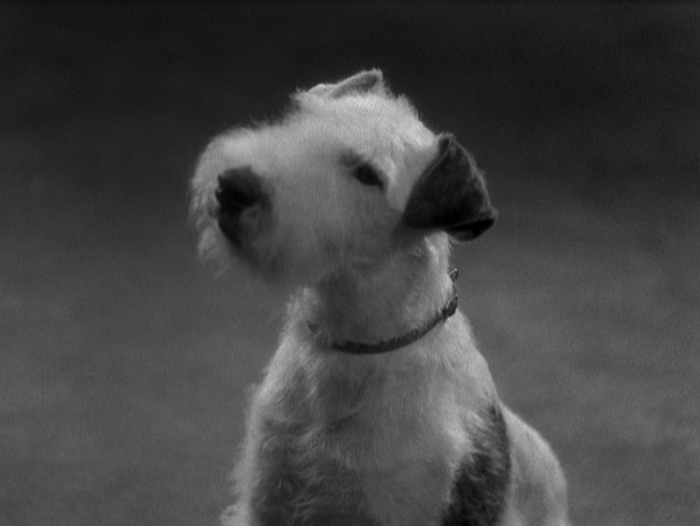
Pre-Code dog alert: Joan has this beautiful wire terrier for a scene.
- FilmFanatic is unimpressed overall, but the first comment on his article I agree with wholeheartedly.
- More screenshots available over at DVD Beaver.
- A second opinion: my wife really hated the ending of the movie and wanted to know what happened next, but liked the rest of it.
- Couldn’t find a trailer for this one, but I did find that Via Margutta 51 has taken scenes from this movie and put Wham’s “Careless Whisper” over it. No, I’m not sure why.
Awards, Accolades & Availability
- This film appeared in the Wikipedia List of Pre-Code Films.
- This film is available in the Universal pre-Code boxset along with Torch Singer, The Cheat, Search for Beauty, Murder at the Vanitiesand Hot Saturday.
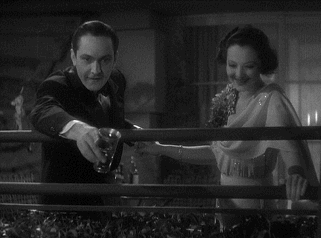 |
Comment below or join our email subscription list on the sidebar!Home | All of Our Reviews | What is Pre-Code? |




1 Comment
Kevin Scott Measimer · May 12, 2014 at 11:15 am
Thanks for another informative and interesting review.
Comments are closed.